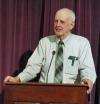Quotes by Wendell Berry
- 1
- 2
The latest technology is not always good for anything except to the producers of the technology.
There are no sacred and unsacred places; there are only sacred and desecrated places. My belief is that the world and our life in it are conditional gifts.
For any sin, we all suffer. That is why our suffering is endless.
The only time I've been arrested was in opposing the Marble Hill nuclear power plant in Indiana. That was in 1979.
To hear of a thousand deaths in war is terrible, and we 'know' that it is. But as it registers on our hearts, it is not more terrible than one death fully imagined.
We have the world to live in on the condition that we will take good care of it. And to take good care of it, we have to know it. And to know it and to be willing to take care of it, we have to love it.
If conservationists will attempt to resume responsibility for their need to eat, they will be led back fairly directly to all their previous concerns for the welfare of nature.
All right, every day ain't going to be the best day of your life, don't worry about that. If you stick to it you hold the possibility open that you will have better days.
I am not bound for any public place, but for ground of my own where I have planted vines and orchard trees, and in the heat of the day climbed up into the healing shadow of the woods.
The care of the Earth is our most ancient and most worthy, and after all our most pleasing responsibility. To cherish what remains of it and to foster its renewal is our only hope.
We learn from our gardens to deal with the most urgent question of the time: How much is enough?
To cherish what remains of the Earth and to foster its renewal is our only legitimate hope of survival.
I come into the peace of wild things who do not tax their lives with forethought of grief... For a time I rest in the grace of the world, and am free.
The past is our definition. We may strive, with good reason, to escape it, or to escape what is bad in it, but we will escape it only by adding something better to it.
Better than any argument is to rise at dawn and pick dew-wet red berries in a cup.
In health the flesh is graced, the holy enters the world.
Under the rule of the free market ideology, we have gone through two decades of an energy crisis without an effective energy policy. Because of an easy and thoughtless reliance on imported oil, we have no adequate policy for the conservation of gasoline and other petroleum products. We have no adequate policy for the development or use of other, less harmful forms of energy. We have no adequate system of public transportation.
I come into the peace of wild things who do not tax their lives with forethought of grief.
Peaceableness toward enemies is an idea that will, of course, continue to be denounced as impractical. It has been too little tried by individuals, much less by nations. It will not readily or easily serve those who are greedy for power. It cannot be effectively used for bad ends. It could not be used as the basis of an empire. It does not afford opportunities for profit. It involves danger to practitioners. It requires sacrifice. And yet it seems to me that it is practical, for it offers the only escape from the logic of retribution. It is the only way by which we can cease to look to war for peace. ... Peaceableness is not passive. It is the ability to act to resolve conflict without violence. If it is not a practical and practicable method, it is nothing. As a practicable method, it reduces helplessness in the face of conflict. In the face of conflict, the peaceable person may find several solutions, the violent person only one.
History leaves no doubt that among of the most regrettable crimes committed by human beings have been committed by those human beings who thought of themselves as civilized. What, we must ask, does our civilization possess that is worth defending? One thing worth defending, I suggest, is the imperative to imagine the lives of beings who are not ourselves and are not like ourselves: animals, plants, gods, spirits, people of other countries, other races, people of the other sex, places and enemies.
It is not from ourselves that we learn to be better than we are.
The change of mind I am talking about involves not just a change of knowledge, but also a change of attitude toward our essential ignorance, a change in our bearing in the face of mystery. The principle of ecology, if we will take it to heart, should keep us aware that our lives depend on other lives and upon processes and energies in an interlocking system that, though we can destroy it, we can neither fully understand nor fully control. And our great dangerousness is that, locked in our selfish and myopic economies, we have been willing to change or destroy far beyond our power to understand.
As industrial technology advances and enlarges, and in the process assumes greater social, economic, and political force, it carries people away from where they belong by history, culture, deeds, association and affection.
- 1
- 2






